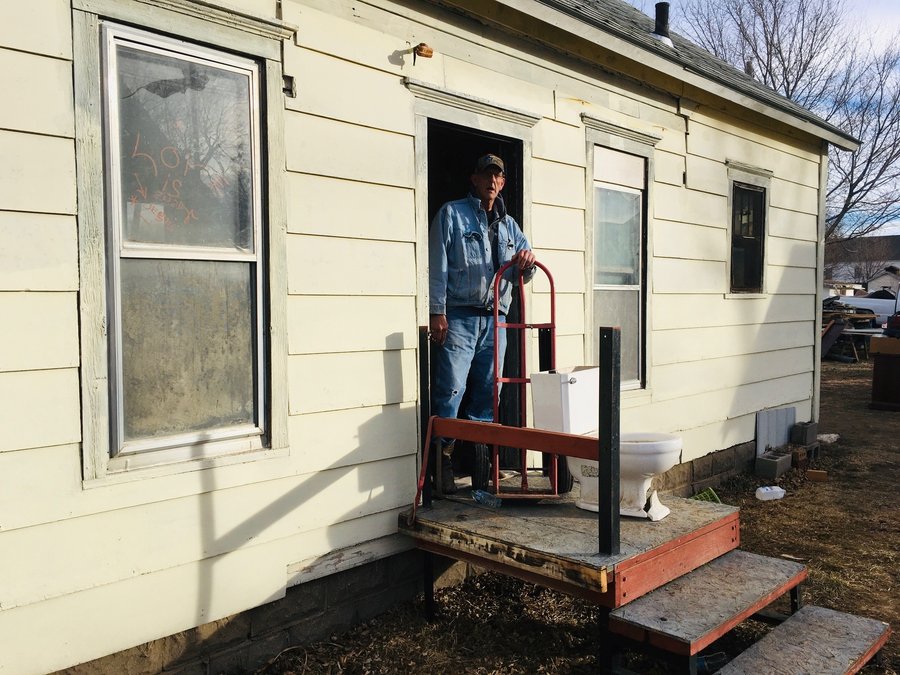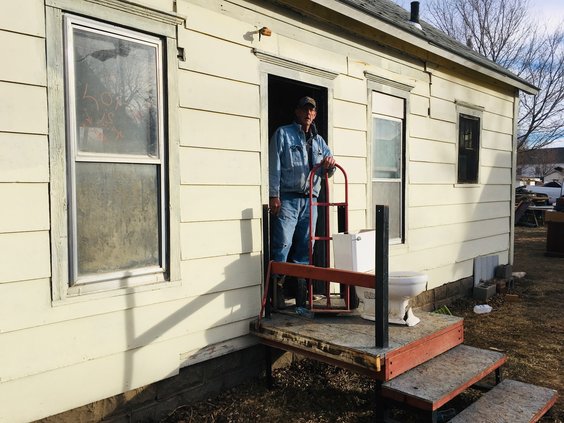HOISINGTON — The second of two 11th-hour appeals went for naught Monday evening as the owner of a residential property in Hoisington’s Fourth Ward scheduled for demolition sought an extension to effect repairs.
Darren Amerine, Hoisington, appeared at the public comments section of the council’s Dec. 28 meeting to ask again for a 30-day extension on the order to demolish the structure, as he said he believed it held historical significance to the community.
Amerine said he has learned that the structure was once used as a bank in Redwing and later moved to Hoisington.
“I know I’ve been before the council before; I appreciate your time,” Amerine said. “What I would like to bring to your attention is about the timeline that I have in knowing about this place.”
Amerine's timeline
Amerine had addressed the council previously at its Dec. 12 meeting, noting that he had just acquired the property and asked for an extension. The motion to grant an extension per his first appeal was denied in a 3-4 vote by the council.
The property, a residence at 166 S. Oak, had been added to a list of properties deemed unsafe or dangerous by the city’s code enforcement officer earlier in the year. At the time, the property’s owner of record was Joe Linsner, who had been presented with due process paperwork prior to a hearing in October. According to city meeting records, Linsner appeared at the October meeting but offered no resistance to the property’s being scheduled for demolition. At the time of the hearing, it was noted that the home had no heating unit, electric, water or sewer services and that earlier in the year, Linsner received all documentation required by city ordinance to request the property be made habitable or it would be razed, the minutes read.
Amerine was approached by Linsner for help in cleaning and repairing the property later in the month after the date of the show cause hearing. Amerine said he agreed, and in payment exchange for work done, Linsner deeded the property over to him, without telling him that it had been scheduled for demolition by the city.
As due process continued on the scheduled demolition, Amerine considered reclaiming the residence as habitable as a revenue supplement for his aging parents. He also investigated the property’s possible historical significance, learning from local Historical Society records that the building had once served as a bank in the neighboring community of Redwing, and was moved to its Hoisington location some 85 years ago. The structure does not currently appear on any state or federal registries as a historic building.
A second appeal
In the time since his first meeting with the council, Amerine has continued to work on the residence, he said. He told the council Monday that the structure appeared sound. “It’s able to be repaired to whatever it needs to be,” he said. “I’ve checked floor joists, wall studs. There’s no chance for the walls to be falling in or the ceiling coming down.” There was some loose plaster, for which Amerine stated he planned to replace the plaster lath with sheetrock. He noted that the woodwork in the home appeared to be hand-carved and not easily duplicated.
When questioned by the council, Amerine acknowledged that he had been misled by Linsner in acquiring the property. “He did me wrong, yes, but I don’t hold a grudge,” he told the council. “I’m just trying to take care of my 90-year-old dad and my 82-year-old mother. This was to be a supplemental income, to help them with their bills.”
In response to councilmembers’ questions, Amerine said he was confident he could have electricity repaired, restored and on-line in 30 days, as well as satisfactory plumbing with water service.
Councilmember Karen VanBrimmer then posed a motion granting a 30-day extension, seconded by Councilmember Gary Shook. The measure was defeated 2-5 by roll-call vote.
The aftermath
With demolition scheduled for Wednesday morning, Amerine asked the council why he was denied. “You’re just a victim of circumstances,” noted Councilmember Jim Morris.
Several councilmembers suggested that Amerine seek remedial action from Linsner, which Amerine was not wont to do.
“Two wrongs don’t make a right,” he noted.
Wednesday morning, he was at the site removing some last items of value before the demolition crew arrived. The council’s decision still rankled, he noted.
“They want to tear it down, turn it into toothpicks,” he said Wednesday. “This is a civil rights issue. It’s not about me any more. I’m going to stand up to them,” he said, standing in the doorway to wait.
The structure was down before noon.
City Manager Jonathan Mitchell noted Wednesday that the city council as the governing body was bound by both ordinances and procedure.
“It’s really an unfortunate situation, the way it happened,” Mtichell said. “But proper procedure was followed.” Mitchell added that state statute on historic structures applies only to those structures already appearing on a state or federal register. “He was caught in the middle,” Mitchell noted.
Additional reporting by Melissa Nech, Great Bend Tribune correspondent.





